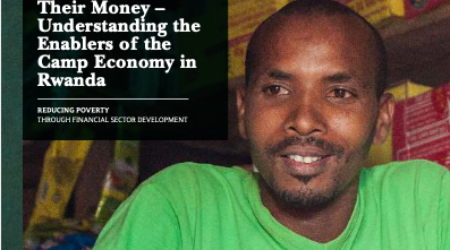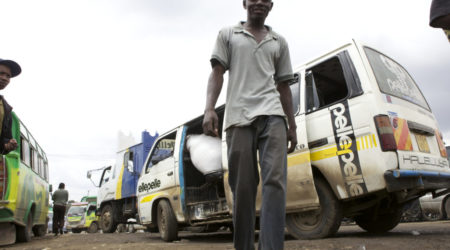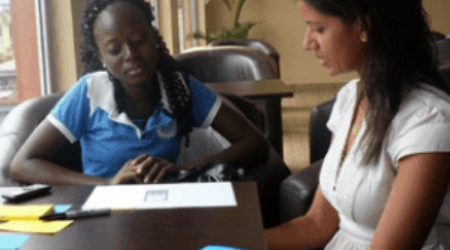Every action counts: Making financial services available to refugees
In a time of global uncertainty, it has become crucial to continue to raise awareness about the plight of refugees. This year, the World Refugee Day theme is #EveryActionCounts. As the world slowed down, I took a moment to reflect on BFA Global’s work in the refugee space over the past four years. I have used the time to strategize on the next steps that create opportunities for Forcibly Displaced Persons (FDPs) to live in a more equitable world. Below are five key takeaways from this period of reflection and our work in East Africa helping FDPs access financial services:
Humanitarian agencies are key partners for Financial Institutions (FI) accessing Forcibly Displaced Persons
FDPs are often found in remote locations where the provision of financial services is difficult, expensive, and perhaps dangerous. This limits access to financial services and key customer touchpoints – a problem that is not easily solved by stakeholders targeting FDPs in particular. Nonetheless, we observed that development agencies could facilitate the growth of a viable and sustainable ecosystem by encouraging financial institutions to participate in infrastructure development when creating digital systems for FDPs to receive benefits. This is evident in the partnership Equity Bank has with UNHCR and WFP or Vision Fund and World Vision in Uganda.
Identification systems for Forcibly Displaced Persons are essential
Some FDPs lack identification documents that are acceptable to local banks and regulators. There are different Know Your Customer laws and regulations that do not explicitly specify requirements for onboarding FDP populations. In most cases, FDPs have either an attestation letter or proof of registration documentation, which is an A4 paper with details of the household members. This is not enough for financial institutions to open up bank accounts. In some cases, financial institutions often tend to develop in-house exclusionary rules based on perceived increased risk and this is mostly for a savings account.
FDPs also have limited mobility because they lack the necessary identification documents. Regulations and restrictions surrounding FDPs, especially those residing in settlement camps, can severely limit access by preventing the creation of financial access points within the camps.
An acceptable identification document that is recognized by financial institutions is essential. If more financial institutions are able to accept Proof of Registration or the attestation document, then it means more FDPs are able to access financial services. By having the right identification document, FDPs are then able to move around a country freely.
There is no “one size fits all” product for FDPs
Similar to the general population, FDPs have various needs including savings, credit products, insurance, etc. As financial institutions continue to interact with FDPs they need to find out their needs. One way of doing this is through the design sprints. In 2017 and 2018, BFA in collaboration with FSD Uganda and FSD Africa conducted design sprints with several financial institutions in both Uganda and Rwanda. Through the design sprint, the FDPs were able to speak directly to providers about their challenges providing insights to specific hurdles they were facing. Design sprints also inspire participants to generate new ideas and receive immediate feedback from potential customers. The exercise helped in the customization of products to fit the FDP population.
Even when access to financial services is available, many other challenges remain
Financial products for FDPs have to be customized to fit their situation. Such products have to cater to mobility and access issues, identification challenges, and literacy levels. FDPs, especially recent arrivals and those in remote settlement camps, lack official identification or smartphones to access digital banking. Some may not have used formal financial services in their home countries. Literacy levels may be low, or they may not fluently speak local and national languages. These are all barriers to the adoption of mobile-phone-based formal financial services.
As we continue to research and interact with FDPs, we get to see that access is not the only barrier. Agent liquidity and capacity within the refugee settlements are not always sufficient. There are also cases of discrimination against FDPs by the financial institutions’ staff. Demands for bribes and the shortchanging of clients during transactions are also common. FDPs do not know their rights in the new country or maybe unwilling to exercise them. They may need an ombudsman function to advocate for equal access and terms for all customers. Many FDPs receive remittances from abroad. International money transfer companies may not have relationships with local financial access networks (such as mobile money agents), increasing the cost and distance for FDPs to access remittances and payments services. Additionally, FDPs less experienced with formal financial services should be provided with timely and relevant information on the services available.
Prejudice blocks financial institutions from a sound business case
FDPs are seen by financial institutions as high-risk clients and more often than not are treated as a homogeneous, unsegmented group. From the market sizing work we did in Rwanda and Uganda for FSD Africa and AFR, we found that FDP incomes can be as high as that of local host populations. This is according to the UNHCR livelihoods surveys in several countries and as noted in the FSD Africa market sizing work in Rwanda. The likelihood of FDPs staying in their current location for many years is high, and generally, the demand by FDPs for accessible, affordable financial services to support their livelihoods is as high or higher than among nationals. Therefore they can be attractive customers for financial institutions if the widespread stereotypes and misperceptions about their financial performance are addressed on the supply side.
In our research, we have found that a lack of information is a major challenge. From the work we have done both in Rwanda and Uganda, finding information that provides insights into the needs of FDPs was difficult. We managed to get data from a university that had done a study in Rwanda and UNHCR data on livelihoods. When we got the opportunity to go to the field in Uganda early this year, to conduct financial diaries research for a joint project with FSD Uganda and FSD Africa, we were able to collect data for a baseline survey that we felt would be useful for both development agencies and financial institutions that would want to work with the FDPs. The baseline survey report will be available at the beginning of July 2020. We will continue to share insights over the next year that will provide a detailed picture about the incomes, expenditures and financial flows of refugee households.
Every Action Counts
As we continue with our work, we are reminded that every action counts for an inclusive and equal world where no one is left behind even in the financial inclusion space. As BFA Global, we will continue to share the insights from our work with the hope that more and more financial institutions are able to bring services to FDPs globally. In the meantime, please be sure to check out our resource and insights page for World Refugee Day 2020.
Our partners for our refugee work include FSD Africa, FSD Uganda, Mastercard, Access to Finance Rwanda, UNCDF and UNHCR.



